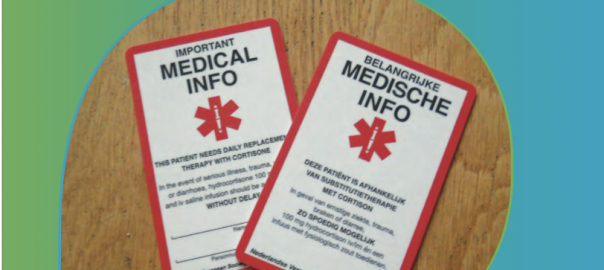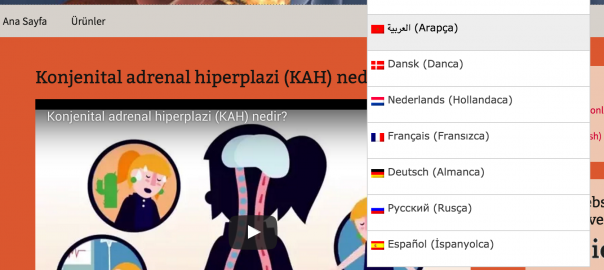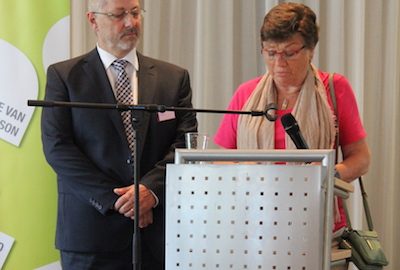This video explains in a simple way what Primary aldosteronism (PA), also known as primary hyperaldosteronism or Conn’s syndrome, means.
https://www.youtube.com/watch?v=d1r1Ui6cDBo
NVACP code:
While many of us were attending this weekend the ESE/ESPE 2025 conference in Copenhagen, we were shocked to hear that our Italian colleague Lorenzo Sala had suffered a heart attack. We later learned that he had passed away in Milan on Monday, 12 May 2025. Lorenzo was a lovely man, a hard-working chairman who led … Continue reading In memoriam Lorenzo Sala
‘The time is ripe to define national care pathways‘ Prof. A.M. Pereira Arias is a specialist in internal medicine and endocrinology and was Professor of Endocrinology at the University of Leiden (the Netherlands) from 2012 until he was appointed Professor of Internal Medicine, with a special focus on endocrinology, at the University of Amsterdam in 2022.In 2012 … Continue reading ROTTERDAMMER GOES TO AMSTERDAM
Abstract Adrenal insufficiency is a life-threatening condition requiring chronic glucocorticoid replacement therapy, as well as stress adaptation to prevent adrenal crises. To increase patients’ self-sustainability, education on how to tackle an adrenal crisis is crucial. All patients should carry the European Emergency Card. Correspondence should be addressed to J G Beun: COOR@BijnierNET.nl Johan G. Beun1, … Continue reading Doctors, teach your adrenal insufficiency patients well: provide them with a European Emergency Card!
On the occasion of the International Rare Disease Day, a special edition of Endocrine has been published by the European Society of Endocrinology with 21 articles on research results and findings in the field of endocrine diseases. The latter has been done thanks to the European collaboration within ENDO-ERN, the European network for endocrinology. Care … Continue reading Good care = care with a plus for people with adrenal insufficiency
This video explains in a simple way what Primary aldosteronism (PA), also known as primary hyperaldosteronism or Conn’s syndrome, means.
https://www.youtube.com/watch?v=d1r1Ui6cDBo
NVACP code:
Friday, 24 April 2020 The Mayor of Nijmegen, Mr H.M.F. Bruls, made a telephone call this morning. He was ringing to pass on some fantastic news to Ad Hermus on behalf of King Willem-Alexander of the Netherlands: namely, that Ad had been appointed an Officer in the Order of Oranje Nassau. This is a splendid … Continue reading Royal honour for Ad Hermus

“It is the story of Ida Margaret, a patient from Norway, who suffered from Cushing’s Disease for fourteen years before being diagnosed. Diagnosis and Management of Cushing’s disease changed her life. It is a small contribution to raise awareness, and to make the voice of patients heard on the International Cushing Awareness Day on … Continue reading Ida’s testimony – Cushing awareness day 8th April 2019
We are still looking at the right translated video of the Dutch video https://www.youtube.com/watch?v=zzCLg6I7kOs here, Please visit this page later.
nvacp11
Pheo Para Alliance animation about paranglioma

Are you often tired and lifeless without obvious reason? Do you often feel overwhelmed by the hustle and bustle of everyday life? Do you feel an urgent need for salty or sweet snacks? Do you struggle to get out of bed? Can you not make it through the day without coffee? If you live with … Continue reading Adrenal burnout? – Henri Timmers

Quite often, neither healthcare practitioners nor the patients know enough about adrenal gland disorders and their treatment. This can lead to serious health risks. The Quality of Care Standard for Adrenal Disorders is intended to help change this situation. Patients played a leading role in drawing up the document that was officially listed in the … Continue reading Quality of Care Standard supports healthcare practitioners and patients alike
This video explains in a simple way what exactly adrenal insufficiency is.
code: NVACP15
A women’s journey through Cushing’s disease.
Made possible thanks to HRA Pharma, Paris.
German and Italian versions to come.

Download PDF

Download PDF

Download PDF

Download PDF

Interview by Dr. Marten Dooper Last year, BijnierNET (AdrenalNET) published the draft version of a national consensus for administering extra hydrocortisone as a way of preventing an Addison crisis in patients with adrenal insufficiency. This ‘stress instruction’ forms part of the Quality of Care Standard for adrenal gland disorders, the first draft of which is … Continue reading Consensus on stress instruction for glucocorticoid suppletion

Jan Smit – 24 november 2016 The materialistic approach to health and illness has brought medicine some spectacular revolutions, but it has also led to ‘solutions’ that bring people no benefit. A rediscovery of the meaning of health and illness could lead to more meaningful care for both patients and healthcare providers. Right through to … Continue reading Blog: From patient to person – Jan Smit

Rutger Nugteren – 14 November 2016 Background For both parents and healthcare professionals, unfamiliarity with rare diseases means that the correct diagnosis is often only arrived at after a lengthy search process which can stretch into years. There is little or no precise knowledge about the extent, the impact and the causes of this diagnostic … Continue reading Blog: Diagnostic delay: the first results trickle through – Rutger Nugteren

AdrenalNET made accessible the well known (English) AdrenalNET animations in Turkish en Arabic. Usefull when on holiday or for your Turkish or Arabic family and friends: adrenals.eu/tr/video/ (Turkish) adrenals.eu/ar/video/ (Arabic) AdrenalNET and its partners and sponsors like the Dutch Health insurance Zilveren Kruis hope that this information about adrenal disease reaches new target groups and will improve treatment and diagnosis. Call for assistance: Are … Continue reading Adrenals.eu animation made accessible in Arabic en Turkish

During the Medical Conference held on Saturday 25 June 2016, the Dutch Adrenal Society NVACP [Bijniervereniging] honoured two members – Alida Noordzij and Johan G. Beun – by granting them honorary membership. Johan Beun was answering a wide variety of questions from participants at the Conference. He was on form, and was explaining about all … Continue reading Going all out for adrenal patients
BijnierNET: successful campaign in response to patients’ wishes There is specially customised medication available for people with an adrenal disorder who are dependent on hydrocortisone. In the Netherlands, the preparation of this customised medication is the domain of specialised compounding pharmacies. In 2015, BijnierNET (AdrenalNET) held several meetings with a number of the larger compounding … Continue reading Improved medication safety
The video on the Hypothalamic-Pituitary-Adrenal axis (HPA Axis)
code: NVACP10
This animated clip – aimed at children aged 12 and over who attend secondary school – explains what CAH is.
The clip first explains where the adrenal glands are located, just above the kidneys. This is followed by an explanation of the function of the adrenal glands, the hormones that are produced, and what happens if you have CAH.
An explanation is given, in simple terms, of what happens when your body doesn’t produce enough cortisol (the stress hormone) and aldosterone (salt hormone), and that if you don’t take your medication a lack of these hormones will result in an excess of male hormones being produced.
code: NVACP03
https://www.youtube.com/watch?v=KI0XXGGbXWQ
[accordion tag=p][accordion-item title=”Dutch”]
https://www.youtube.com/watch?v=baSNvNy5MIU
[/accordion-item][accordion-item title=”Turkish”]
https://www.youtube.com/watch?v=7dd3LBn2T68
[/accordion-item][accordion-item title=”Arabic”]
https://www.youtube.com/watch?v=o7wbqY0gDiE
[/accordion-item][accordion-item title=”Russian (subtitled)”]
https://www.youtube.com/watch?v=KI0XXGGbXWQ?yt:cc=on&&cc_lang_pref=ru&cc_load_policy=1
https://www.youtube.com/watch?v=KI0XXGGbXWQ?yt:cc=on&&cc_lang_pref=ru&cc_load_policy=1
[/accordion-item][/accordion]
What should you do if an Addison crisis threatens? How do you prepare an emergency injection and how do you administer it? If you have a gastro-intestinal infection, accompanied by diarrhoea and vomiting, there is a big risk of an Addison crisis. Always discuss with your specialist what you have done and what else needs to be done. Explain to your family, colleagues and friends what illness you have, and what they should do if necessary. Show them the animated clip.
code: NVACP 04
https://www.youtube.com/watch?v=1MBso7ZuF1c
Short animation on Addison crisis for adults
code: NVACP06
https://www.youtube.com/watch?v=yfK3L2FYPYM
This animated clip explains that some children stay smaller than average because their bodies don’t produce enough growth hormone. If the doctor can’t actually see any reason for this, tests have to be carried out in the hospital. And if your body isn’t producing any growth hormone itself, you have to have an injection in your thigh, tummy or buttock every evening. As a result, you will grow and get to be just as tall as all your friends.
code NVACP08
https://www.youtube.com/watch?v=XlBz7F4P71o
[accordion tag=p][accordion-item title=”Dutch”]
https://www.youtube.com/watch?v=-etxV_wAM4A
[/accordion-item][accordion-item title=”Russian (subtitled)”]
https://www.youtube.com/watch?v=XlBz7F4P71o?yt:cc=on&&cc_lang_pref=ru&cc_load_policy=1
https://www.youtube.com/watch?v=XlBz7F4P71o?yt:cc=on&&cc_lang_pref=ru&cc_load_policy=1
[/accordion-item][/accordion]
The pituitary gland produces the hormones that pass instructions on to many of the body’s major organs such as the liver, the sex organs, the kidneys, the adrenal glands and the thyroid. The pituitary sends a signal hormone out to the organ to get it working. If the adrenal glands work too hard, less signal hormone is sent out; if they work too slowly, more signal hormone is produced and exactly the same happens with other organs and glands too. The pituitary gland monitors, activates and suppresses the liver, the sex organs, the kidneys, the adrenal glands and the thyroid.
code NVACP07
https://www.youtube.com/watch?v=5QTNWNalWtA
[accordion tag=p][accordion-item title=”Dutch”]
[/accordion-item][accordion-item title=”Turkish”]
https://www.youtube.com/watch?v=sswAR0t3RM0
[/accordion-item][accordion-item title=”Arabic”]
https://www.youtube.com/watch?v=pwujszYfeNY
[/accordion-item][accordion-item title=”Russian (subtitled)”]
https://www.youtube.com/watch?v=5QTNWNalWtA?yt:cc=on&&cc_lang_pref=ru&cc_load_policy=1
https://www.youtube.com/watch?v=5QTNWNalWtA?yt:cc=on&&cc_lang_pref=ru&cc_load_policy=1
[/accordion-item][/accordion]
This animated clip explains, in simple words, that the adrenal glands of a child who has CAH are ‘sick’. These children don’t produce enough of the hormone that provides energy, so they have to take ‘cortisol’ in the form of a pill. When exciting or stressful things happen, or the child becomes ill, he or she needs to take extra pills. To explain that to everyone – in case Mum and Dad are not around – the child has to wear an SOS talisman (medical alert necklace or bracelet) which gives information about the adrenal gland disorder.
Code NVACP02/01
https://www.youtube.com/watch?v=_0ZkflGA60M
[accordion tag=p][accordion-item title=”Dutch”]
https://www.youtube.com/watch?v=TVj6kPBfEPY
[/accordion-item][accordion-item title=”Turkish”]
https://www.youtube.com/watch?v=GpQaNtBEV-A
[/accordion-item][accordion-item title=”Arabic”]
https://www.youtube.com/watch?v=rdhHXkSc6TM
[/accordion-item][accordion-item title=”Russian (subtitled)”]
https://www.youtube.com/watch?v=QgImNyfd8mA?yt:cc=on&&cc_lang_pref=ru&cc_load_policy=1
https://www.youtube.com/watch?v=QgImNyfd8mA?yt:cc=on&&cc_lang_pref=ru&cc_load_policy=1
[/accordion-item][accordion-item title=”French (subtitled)”]
https://www.youtube.com/watch?v=QgImNyfd8mA?yt:cc=on&&cc_lang_pref=fr&cc_load_policy=1
https://www.youtube.com/watch?v=QgImNyfd8mA?yt:cc=on&&cc_lang_pref=fr&cc_load_policy=1
[/accordion-item][/accordion]
This animated clip provides support and advice for the carers of a patient with an adrenal gland disorder. Who might be a carer for an Addison patient? Actually, anyone who is close to the patient: the partner, children, neighbours, friends, family members, colleagues. What do you need to know about an Addison crisis: you should know what happens during a crisis, and – of course – you should know how to recognize one, where the medication and the emergency injection is kept, which hospital the patient visits and the name of the specialist. It is useful to keep all medication together in an easily accessible location and to make sure that the carer knows where it is. In the event of an Addison crisis, if the patient is vomiting, has diarrhoea, or is unconscious, you need to give the patient extra pills or an emergency injection, then phone the specialist at the hospital and discuss what else needs to be done. You should remain with the patient if at all possible, so that you can explain to others what needs to be done if the patient is incapable. Afterwards, check that everything went OK and think about what could have been improved.
https://www.youtube.com/watch?v=074jRbhKHjw
Code NVACP09
This animated clip explains what an Addison crisis is and how it can come about. Because of fever, stress, vomiting or diarrhoea, for example, or when you need to have an operation. If you need an operation or other medical treatment, you should always explain to the doctor or anaesthetist that you need to have extra cortisone. There are special ‘stress guidelines’ for this purpose. It can also be necessary to take extra pills, or have an injection, in the event of psychological stress. Symptoms: feeling very cold, distracted, dizzy or extremely fatigued.
After taking the pills or having the injection you should quickly feel better. Once you feel better you should go back to taking the normal daily doses as prescribed.
https://www.youtube.com/watch?v=MNVPMEV4heQ
code: NVACP05
Adrenals.eu aims to give information on Adrenal Glands related subjects in multiple languages. It is a new initiative of BijnierNET Read more about it.